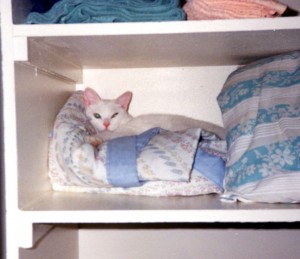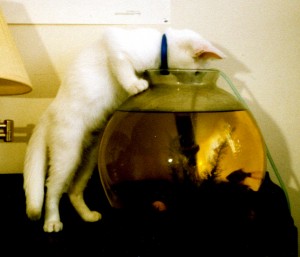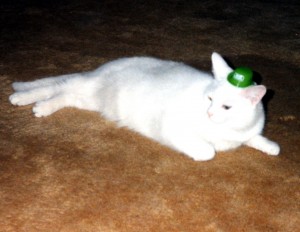If I were inclined to be paranoid, my delusions would start with every Phone Company’s apparent desire to screw with me on a more-or-less regular basis, ever since I’ve had a phone. This is only made more sinister by the fact that it’s nearly impossible to get away without having a phone these days, and even now, it’s impractical if not impossible to choose a different local phone company. The choice afforded by long distance companies has complicated things further – while rates and service have improved somewhat, this is at least partially offset by having to explain to some poor telemarketing schlub that no, you don’t want to change long distance carriers during dinner.
I first got an inkling for the evil that lurks behind the friendly facade of a monopoly with a huge advertising budget when I first moved to Chicago. I called the local phone company to arrange a connection in service to my new apartment – long distance, as I was actually planning ahead.
“I’m sorry,” the disinterested voice told me, “we can’t connect your service until you pay an outstanding bill for $245.”
This was pretty odd. “How can I have an outstanding bill? I’ve never even been to Chicago.”
“Well, our records show an outstanding bill for $245 for calls made by Rita Brown.”
Even weirder. “Who the hell is Rita Brown?”
“Our records show that you live with her.”
“WHAT?” I’m not sure what was more disturbing, the fact that I was being saddled with a phantom bill for somebody I’d never even heard of, or the fact that the phone company apparently keeps records on who is living with whom in Chicago. So I tried reason. “I’ve never even heard the name before.”
“Well, sir,” (you always hear at least one “sir” when you start to get peeved) “we can’t just let her get a phone under your name until she pays her bill.”
“Why would I care whether or not she pays her bill? Since I’ve never heard of her, I’ll promise you that I won’t let her use my phone, even if she shows up at my door bleeding from a gunshot wound. Do you want me to sign something?”
“Well, actually, if you could call her and ask her to come in and sign a paper that she doesn’t know you…”
I was afraid that if I let her continue, irreparable damage might be done to my brain. “Wait, let me get this straight: you want me to call somebody I’ve never heard of, whose phone you’ve probably disconnected anyway for not paying her bill, and convince this woman to sign a paper that says she’s never heard of me so that I can get a phone?”
“Exactly.” she said, apparently pleased at getting her point across. After a moment’s reflection, she added, “Maybe you should write her a letter.”
Still fearing for my tender brain, I tried to remain calm. “How can I write a letter to somebody I’ve never even heard of before?”
“Sounds like it would be easier if you just paid the bill.”
“Look, I am not going to pay her bill. I can’t think of any reason why I would agree to pay that woman’s phone bill just to get my own phone.”
“I thought you said you’d never heard of her.”
“What? Of course I haven’t heard of her. What are you talking about?”
“Well, you seem to have some bitterness toward this woman. Was it a bad breakup?”
If I’d had a power-horn handy, I’m sure I would have held it up to the receiver and blasted it until it was completely discharged. I don’t even own a power-horn, but I looked around just in case. “I’m going to say this slowly. I have never heard of this woman. I am not going to be your collections department. I am not going to pay a bill that isn’t mine. I need to talk to your supervisor.”
A good four hours and five supervisors later, I finally got somebody to agree to give me a phone without having to pay somebody else’s phone bill. Frankly, if Rita Brown ever does happen to stop by, I’d let her use the phone as much as she wanted.
Back when I still got paper bills, I would occasionally receive a beautifully worded form letter enclosed with my bill, asking for extra money. I won’t attempt to do the skillfully crafted prose justice, but I’ll distill the main points:
- Some people can’t afford phones
- Everybody on Earth should have a phone
- We don’t want to lower our rates
- Please pay us extra so that we don’t have to lower our rates
- With all that money, we can give phones to people who can’t afford phones
It’s not many a company with the audacity to attempt to increase their market share by soliciting donations, but aside from being just evil, this is somewhere between brilliant and awesome — unfortunately, it really works only for products that people actually need. “Not everybody can afford a Porsche, and we’re sure as hell not making them any cheaper, so why not pledge money now so a needy family can afford one?”
One of the stranger things my local phone company did is send me their monthly bill — but this time, for over $6000. I found this a little unusual, especially since the bulk of the charges were listed under “miscellaneous.” Naturally, I called to complain.
“Hello, I just received a local phone bill for $6000.”
There was a long pause, presumably while the customer service representative looked up the information, but it doesn’t appear to have struck her as unusual in any way, since she returned with a prosaic, “Yes?”
“Well, I calculated that at even at the highest rates, if I made one phone call per second, 24 hours a day, 7 days a week, I couldn’t rack up a bill nearly this high.”
She seemed unclear on what I was complaining about. “So you want a second line installed?”
“No! I don’t want a second line installed, I want these charges taken off my bill.”
“What are the charges for?” she asked.
I wasn’t prepared for this question, mostly because it’s what I was asking. “I have no idea. What could possibly be worth $6000?”
“Well, you must have ordered something.”
“Like what? Phone company massages? A phone company grand piano? Perhaps that phone company car I’ve always wanted?”
“Well, these charges don’t just come out of nowhere.”
“Okay, how about this: you tell me what I’m being charged for, and if you can’t, you take it off my bill.”
(Long pause.) “It says here it’s for ‘miscellaneous.’”
“Okay, what, specifically, does that mean?”
There was a very long pause, which I took to mean that I was getting somewhere. While I was waiting, I was treated to some elevator music punctuated by a bone-jarring voice proclaiming that “All operators are busy. Please continue to hold.” And what seems slightly more sarcastic each time you hear it: “Your call is very important to us.”
The music finally stopped. “Sir?”
“Yes?”
“Are you still there?” (A casual observer might have deduced this from the answer to the first question, but I didn’t want to distract her.)
“Yes, I am.”
“Miscellaneous is what they list things under that don’t go into other categories.”
I’m not sure if she’d consulted a dictionary or a corporate manual, but neither was really helpful. “Oh, good, so they haven’t invented a completely new definition for the word. Who can tell me what, exactly, they have chosen to bill me for, and place into this category?”
“It doesn’t say.” (Long pause.) “I didn’t put it in there.”
At this point, I couldn’t think of anything to say, so we both stayed on the phone in uncomfortable silence. “Okay then,” I ventured after a while, “can you kindly remove it from my bill if nobody knows what it is for?”
“I could put you on a payment plan.”
“I don’t want to be put on a payment plan. I don’t want to pay it at all.”
She laughed. “Wouldn’t that be nice?”
“Okay, look: I have nothing in my possession, and have received no services from the phone company, worth anywhere near $6000, and I am not going to pay a bill for something I did not get.”
“Ohhhhhh,” she said, as if something had just dawned on her. “In that case, why don’t you tell me what you ordered, and I’ll re-enter the order, and you won’t have to pay until we can complete the order.”
“You don’t understand. I didn’t order anything. I don’t want to order anything.”
“You want to cancel the order?” she tried.
“What order?”
“You’ll have to tell me, or I can’t cancel it.”
If you had asked me the day before how hard it would be to get an obvious billing mistake corrected, I’d have probably replied, “not that hard,” like an idiot. I was clearly getting nowhere. “Okay, I’ll make this simple. Will you take this charge off my bill?”
“I can’t do that. It’s obviously there for a reason.”
“Okay, then let me talk to your supervisor…”
A few hours and supervisors later, I was under the mistaken impression that I had finally convinced somebody to correct my bill. However, the next month I received notice that the first installment on my six-month payment plan was due. Yes, that’s right, instead of correcting the $6000 charge, I’d been put on a payment plan, where I only had to pay a little over $1000 each month.
Each month, for six months, I had to call and get $1000 taken off my bill.







